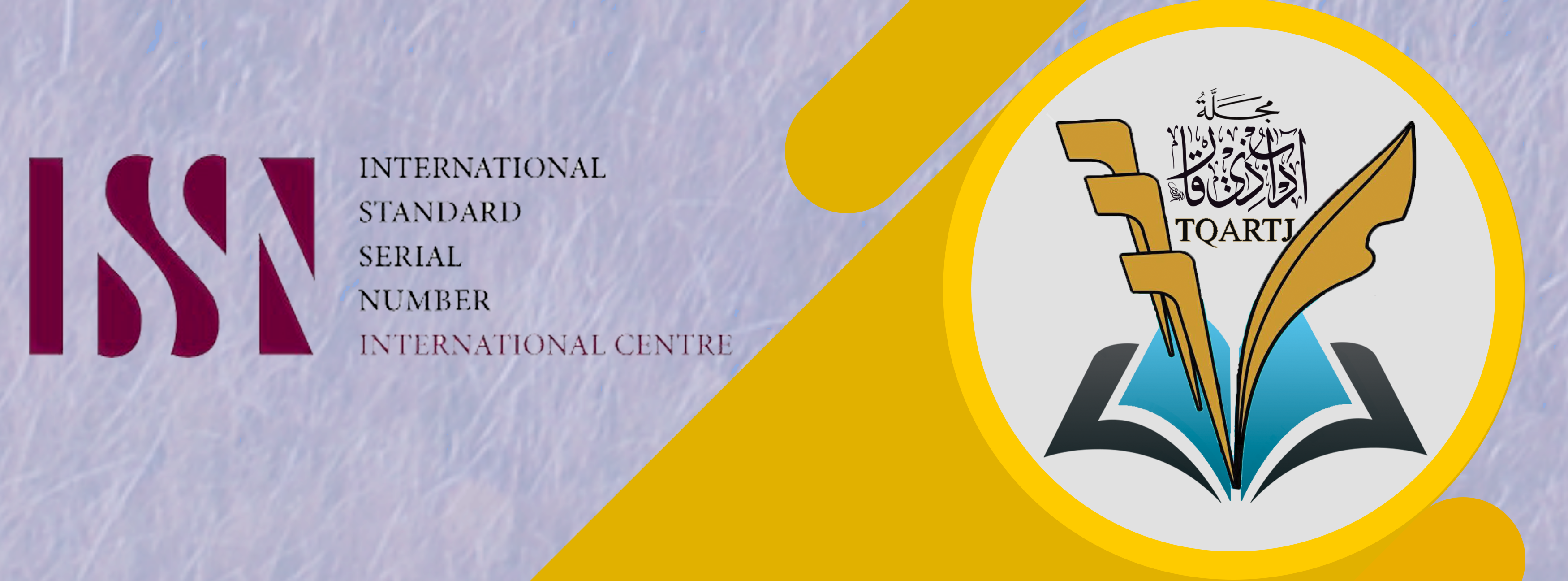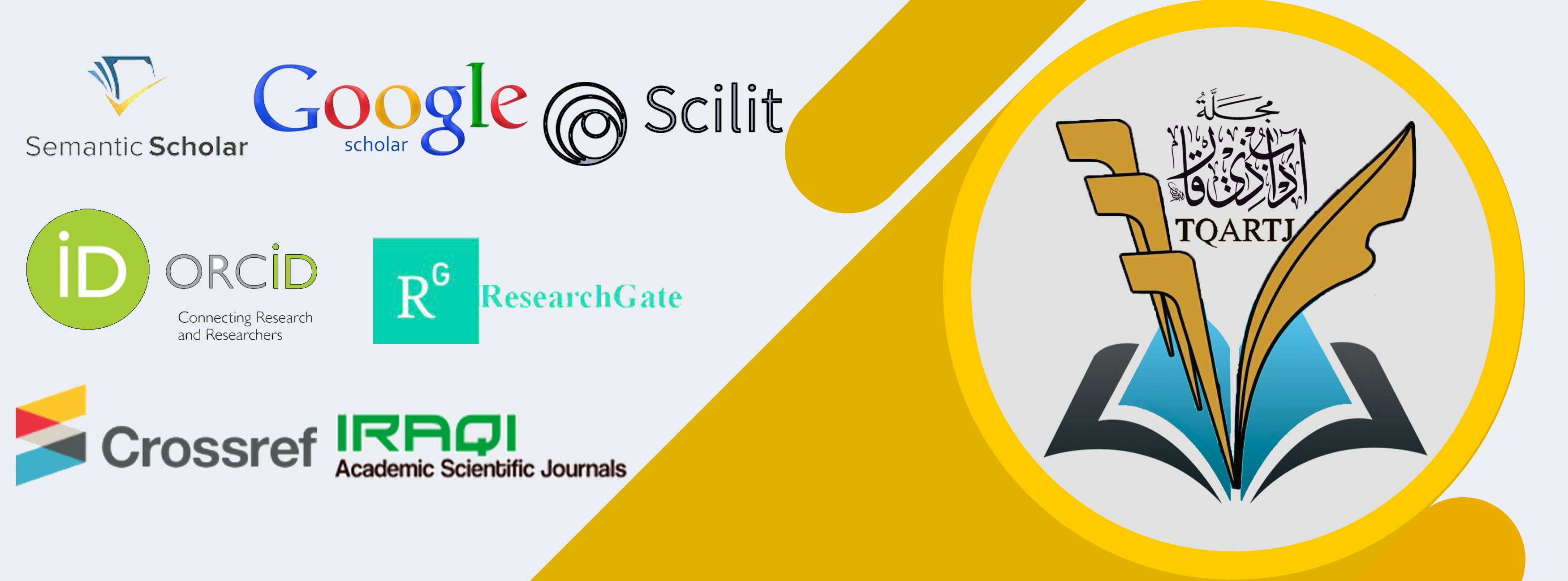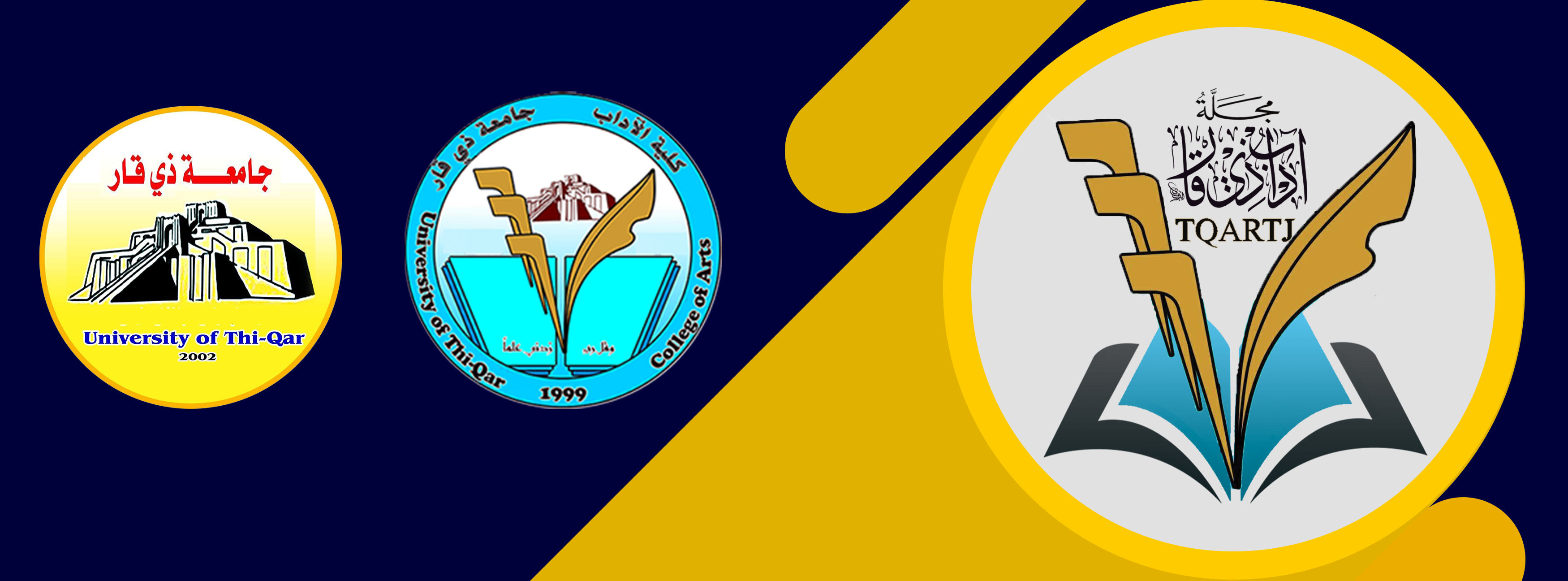Forms of Discrimination against Woman in Selected Iraqi Proverbs: A Critical Discourse Analysis
DOI:
https://doi.org/10.32792/tqartj.v2i40.373الكلمات المفتاحية:
التحليل النصي النقدي- الافكار المؤدلجة- المراة - التمييز الجنساني- الامثال العراقيةالملخص
تهتم الدراسة الحالية بموضوع التمييز ضد المراة في الامثال العراقية وعلى وجه التحديد الامثال المستخدمة في بغداد والبصرة في ضوء التحليل النصي النقدي و تهدف الدراسة الحالية الى بيان الايديولوجيات في تلك الامثال عن المراة.ان اهمية الدراسة الحالية تكمن في كشف اشكال التمييز المختلفة ضد المراة في الامثال سالفة الذكر وقد تم جمع البيانات من كتب مرجعية مهمة عن الامثال كالامثال الشعبية في البصرة للدليشي والامثال البغدادية بجزئيه للحنفي اضافة لبعض الامثال الماخوذة من الزبيدي. تم تحليل تلك الامثال بناء على تاويلاتها في الكتب المرجعية التي وردت فيها اضافة الى ذلك فقد تم اختيار تلك الامثال بسبب انه يبدو انه لم يتم تناولها من قبل اي باحث من منظور التحليل النصي النقدي من قبل وقد تم اتباع المنهج النوعي في التحليل النصي النقدي للامثال كذلك تم اختيار اربعة وثلاثين مثالا وتم تحليل فقط تسعة امثال لكشف الايديولوجيات الجنسانية ضد المراة سواء كان ذلك في التركيب او الوظيفة للامثال او في كلاهما . لقد توصلت هذه الدراسة الى نتائج تكشف عن وجود اشكال تمييز مختلفة ضد المراة وهي كالاتي: كراهية ولادة الانثى وذم المراة وتعنيفها والتمييز ضدها على اساس العلاقات الجنسانية والحالة الزوجية والجمال اضافة للنظر لها بدونية وتحقير عملها كذلك فان تلك المفاهيم التمييزية ضد المراة نقلت عن طريق التركيب والوظيفة للامثال وقليل منها قد وردت فيه تلك المفاهيم عن طريق التركيب فقط فيما وردت في الوظيفة في مثل واحد فقط.
التنزيلات
المراجع
Aldileeshy,A.(1968). ʼalʼamthāl ʼashshaʼbiya fil Baṣrah* (trans. Folk
Proverbs in Basra) (Vol.1.). Baghdad: Dar Altadhamun Press.
Al-Hanafi. J., A. (1964). ʼalʼamth āl ʼalbghdādiya (trans. Baghdadi
Proverbs) (Vol.2.). Beirut: Dar Albaydha'.
Al-Hanafi. J., A. (1962). ʼalʼamth āl ʼalbghdādiya(trans. Baghdadi
Proverbs)(Vol.1). Beirut: Dar Albaydha'.
Al-Janabi, M. (2020). Domestic Animals in English and Iraqi Rural
Proverbs: A Pragmastylistic Study. Journal of the College of
Languages, 41, 1-26.
Alubaidi, A.A.(2010). ṣūrat ʼalmarʼa fil ʼamthāl ʼasha‘biya
(trans.Woman’s Image in the Folk Proverbs) .Mosul Studies, 30, 23-42.
Alubaidi, A., A. (2006). ʼarramz fil ʼamthāl ʼasha‘biya ʼalmūṣilya
(trans.Symbolism in the Musoli Folk Proverbs).Mosul Studies, 14, 35-52.
Al- Zubaidi, N.A. (2019). Woman Stereotypes and Patrarchical Hegemony:
A Feminist Stylistics Analysis of Iraqi Folk Proverbs. AL-USTATH, 58
(1),67-84.
Blommaert, J. (2001). Context is/ as critique. Critique of
Anthropology, 21 (1), 13-32.
Blommaert, J. & Bulcaen, C. (2000). Critical Discourse Analysis.
Annual Reviews of Anthropology. Retrieved
March 2, 2019 from
https://www.jstor.org/stable/223428?seq=1#page_scan_tab_contents
Chen, Z. (2016). Critical Discourse Analysis of Sexism in English
Language. Retrieved March 2, 2019 from
https://pdfs.semanticscholar.org/6ebe/dca5acafee6e84c2d687d70017ed76a75d26.pdf
Dia, G. & Amfo, N., A., A .(2014).Caring Supporters or Daring
Usurpers? Representation of Woman in Akan Proverbs.
Discourse and Society, 1-26.
Fairclough, N.(1995). Critical Discourse Analysis: The Critical Study of
Language. London/New York: Longman.
Hoyt, C. Jr. (2012). The Pedagogy of the Meaning of
Racism: Reconciling A Discordant Discourse. National
Association of Social Workers. Vol. 57(3), 225-234.
Khosravinki, M.(2014). Critical discourse Analysis, Power and Media
Discourse. In Kopytowskaa, M. & Kalyango, Y. (Eds.).
Negotiating Identity in the Modernized World (pp.283-301).
New York: Peter Lang.
Llanco, C et al (2021). Ideology, Sexism, and Beliefs about Sexual Violence in
Peruvian University Students and Future Police officers. Psocial, 7
(1),16-32.
Mariwah, S. et al.(2022). Gender (In)Equality in Ghana: A Critical Discourse
Analysis of Akan Proverbs on Masculinity. Journal of Asian and
African studies,2 , 1–17.DOI: 10.1177/00219096221079323
Muhsin, M. A. (2015). ʼalbu‘d ʼannafsī wattarbawī fil ʼamthāl
ʼashsha‘biya ʼal‘īrāqiya (Trans. The Psychological and
Educational Dimension of Iraqi Folk Proverbs). Alfath Journal, 64,
-349.
Rasul, S. (2015). Gender and Power Relationships in the Language of
Proverbs: Image of a Woman. FWU Journal of Social
Sciences, 9 (2), 53-62.
Thanoon, N.A.(2016). ʼal‘unf ḍid ʼalmarʼah* fil ʼamthāl ʼashsha‘biya
ʼalmūṣilya ( trans. Violence Against Woman in the Museli
proverbs). Misan Studies,12 (3), 283-302.
Van Dijk, T., A.(2006). Ideology and Discourse Analysis. Journal of
Political Ideologies,11 (2), 115-140.
Van Dijk, T., A.( (2006). Politics , Ideology , and Discourse. In
Brown. K, (Ed.). Encyclopedia of Language and Linguistics,
Vol. (2nded) ( pp.728-74). Oxford: Elservier Science.
- Van Dijk, T., A. (2005). Ideology and Discourse: A Multidisciplinary
Introduction. Retrieved March 6, 2019 from
http://www.discourses.org/UnpublishedArticles/Ideology%20and%20discourse.pdf
- Van Dijk, T., A. (2001). Critical Discourse Analysis . In Shiffrin, D.,
Tannen, D.& Hamilton, H. (Eds.). Handbook of Discourse
Analysis (pp. 352-371). Oxford: Blackwell.
التنزيلات
منشور
إصدار
القسم
الرخصة
الحقوق الفكرية (c) 2022 Lecturer. Huda Hadi Badr

هذا العمل مرخص بموجب Creative Commons Attribution 4.0 International License.
تطبق المجلة رخصة المشاع الابداعي (a Creative Commons Attribution 4.0 International) . تسمح هذه الرخصة للمؤلفين بالاحتفاظ بحقوق النشر لأوراقهم. ولكن هذه الرخصة تسمح لأي مستخدم بتحميل، طباعة، استخراج، إعادة استخدام، أرشفة، وتوزيع المقال، طالما يتم إعطاء الائتمان المناسب للمؤلفين ومصدر العمل. تضمن الرخصة أن يكون المقال متاحًا على نطاق واسع قدر الإمكان وتضمين المقال في أي أرشيف علمي.


















